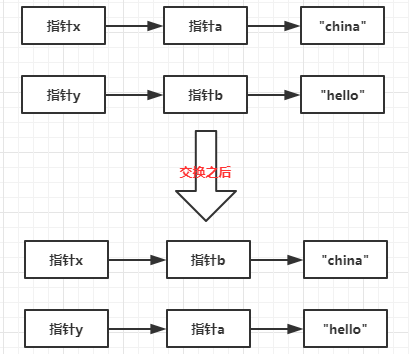程序一:交换值
#include <stdio.h> void swap(int *x , int *y){ int *temp; temp = x; x = y; y = temp; } void main(){ int a = 1; int b = 2; swap(&a , &b); }
对于程序一,在它运行完成之后,a,b的值并没有发生变化。
原因是swap函数里面的x,y都是形参,函数里面对形参的地址进行了交换,这并没有交换main函数中的a,b这两个变量指向的地址。
程序二:交换值
#include <stdio.h> void swap(int *x , int *y){ int *temp; temp = x; x = y; y = temp; } void main(){ int *a = 1; int *b = 2; swap(a , b); }
程序二也不能交换a,b所指向的值,原因类似于程序一的错误原因。
程序三:交换值
#include <stdio.h> void swap(int x , int y){ int temp; temp = x; x = y; y = temp; } void main(){ int a = 1; int b = 2; swap(a , b); }
程序三运行完之后,a,b的值也没有发生交换,是因为swap函数中的形参x,y发生了值的交换,而并不是main中实参的值交换。
程序四:交换字符串
#include <stdio.h> void swap(char **x , char **y){ char *temp; temp = *x; *x = *y; *y = temp; } void main(){ char *a = "china"; char *b = "hello"; swap(&a , &b); }
程序四可以交换两个字符串,其原理如下图所示:

程序五:交换字符串
#include <stdio.h> #include <string.h> void swap(char *x , char *y){ char temp[10]; strcpy(temp,x); strcpy(x,y); strcpy(y,temp); } void main(){ char a[10] = "china"; char b[10] = "hello"; swap(a , b); }
程序五也可以交换两个字符串,运用到了strcpy函数。